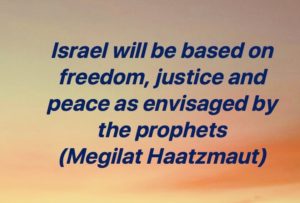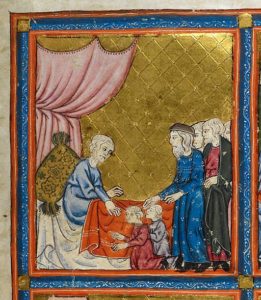
Benjamin Netanyahu, who will do anything and everything to get re-elected, especially rousing the most racist section of his base, has now crossed a red line. Fearing for his political future he engineered a merger between the current party of Kahanism, Otzma Yehudit (“Jewish Power”) with the National Union Party so that it could enter the Knesset surreptitiously, in a consolidated right-wing party and bolster his electoral bloc. Michael Ben-Ari, a leader of Otzma Yehudit, was denied a visa to enter the US due to the State Department’s “prerogative to ban terrorists from entering the country.” He was now promised a seat in the next Knesset.
Until this past week Kahanism was largely banned from the political process. Meir Kahane’s party, Kach, was banned from the Knesset in 1988, was outlawed as a terrorist organization in Israel in 1994, and still appears on the US State Department list of Foreign Terrorist Organizations. Netanyahu, in a blink of an eye, just lifted the ban.
Kahanism is an American export to Israel. Peter grew up in a neighborhood in southeastern Queens where Meir Kahane was the rabbi of the local orthodox shule, before Kahane became notorious. In the late 1960s he attended a few Bar Mitzvahs in the shule. It was almost a normal synagogue except that it was surrounded by razor wire and a high fence, as if it was an auto parts store in a high crime neighborhood. When he founded the Jewish Defense League in 1969, after the bitter teacher’s strike that raised Jewish and black tensions, some of its earliest members were his acquaintances. Its initial targets were not Palestinians but African Americans. The appeal of the JDL was, to those Peter spoke to, that blacks had been pushing Jews around, and the next time black kids wanted to fight, they would be ready.
Kahane had a Betar and Revisionist background, and around 1970 he turned his attention to Israel, where he found an even bigger scope for his racism, in a situation that was even more violent, and where Kahane’s victims had even less legal protection. He and his followers wanted to expel all Palestinians, Israeli Arabs, and Palestinians in the territories. They often plastered the word Transfer, a euphemism for ethnic cleansing borrowed from Nazi Germany, in places with large Israeli Arab population.
Kahane was murdered in 1990 in New York City but Kahanism in Israel survived, and engaged in a series of terrorist acts. In 1994 Baruch Goldstein, a member of Kach, originally from Brooklyn, massacred 29 Palestinians praying in Hebron, in what remains probably the most notorious episode of Jewish terrorism. Kahanism combines two virulent strains of racism, American and Israeli. Much of vigilante terrorism against Palestinians has been traced to followers of Kahanism legacy. Kahanists today oppose Jewish-Palestinian marriages, and call for the expulsion of Palestinians from Israel and the territories.
There is hard right wing politics, the sort followed by Netanyahu, Naftali Bennett, and Miri Regev, to stick to current Israeli politics, and then there is fascism. The main difference is that fascism takes right wing politics to its logical conclusion; its politics are only the politics of repression, and eliminating the targets of their hate by any means necessary. With this move, Netanyahu has openly aligned himself with Jewish fascism, and those who aid and abet fascism are fascists. And people of good will cannot have any dealings with fascists.
Israeli politics is indeed very complicated. Every election cycle, there are new parties and new names. It is too complicated for most Americans; even most American Jews who care about Israel, to follow closely. Two party democracies have their limitations but at least most people know the names of the two parties. But most American Jews know who Kahane was and what Kahanism is.
It is heartening that Netanyahu’s move has been condemned across the political spectrum, from the usual left of center Jewish groups to the center and center-right organizations like American Jewish Committee and AIPAC. More than 90 Orthodox rabbis have issued a fierce denunciation of Netanyahu’s invitation to Kahanists. While encouraged by this first step, we must prepare for the next, to make sure that Netanyahu and the Likud are unacceptable. And American Jews have a role to play. We all need to tell our representatives that any government with Jewish fascists is illegitimate, and should be treated as such.
There is a practical dimension to this. For the first time, with the merger of the lists of Gantz and Lapid, Netanyahu seems beatable. We do not know what sort of government the Gantz/Lapid ticket lead, but it would probably have to be a center-left coalition of some sort (Probably, these things can get tricky.) We do not have much faith in Gantz, but one thing is absolutely clear; if the two state solution is to have any chance, Netanyahu cannot be the PM. And Democrats that control the House need to chart their own foreign policy, and a pro-Israel, anti-Jewish fascist position seems broad enough to attract a number of Democrats, even those who previously have been defenders of Netanyahu. And if Democrats and American Jews make their views heard clearly and loudly enough, perhaps this might have an effect on the Israeli elections.
But whatever happens in the election, we must be clear about where we must be. We have a key role here, in every synagogue in America, in every Jewish organization in America, Jewish fascism, and Netanyahu’s embrace of Jewish fascism must be loudly condemned and anathemized. Kahanism, an American-Israeli species of Jewish fascism is a unique menace to the Jewish people. It must be fought, banned, and rejected. This fight is deeply rooted in a clear Torah Jewish position, “One law shall be there for you, for sojourner and native alike” and in the Founders’ Proclamation that the state of Israel “will ensure complete equality of social and political rights to all its inhabitants irrespective of religion, race or sex.”








